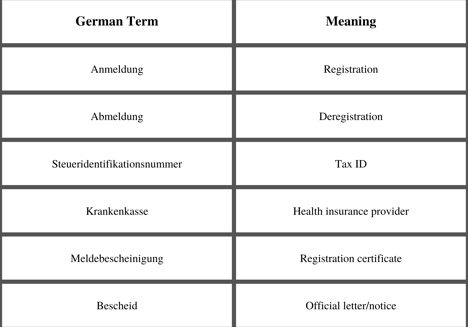
Your ultimate guide to financial wellness & stability!!!

How to Survive German Bureaucracy (and Stay Sane!)
Germany is famous for its precision, punctuality — and its paperwork. Whether you're registering your address, opening a bank account, or applying for health insurance, the bureaucracy can feel like a full-time job. But don’t worry — with the right mindset and some practical tips, you can survive German bureaucracy (and even laugh about it later). Here’s how:
Amit S
5/5/2025


1. 📍 Master the Anmeldung (Registration)
Your first big step: Anmeldung — registering your address at the local Bürgeramt (citizen’s office). Without this, you can’t do much in Germany.
✅ What you need:
Passport
Signed Wohnungsgeberbestätigung (landlord confirmation)
Rental contract (optional but recommended)
🧠 Tips:
Book appointments weeks in advance — or check portals early in the morning for cancellations.
Go early, bring multiple copies, and never expect things to be digital.
2. 🧾 Embrace Paper — It’s Your New Life Partner
Germany loves paper documentation:
Contracts
Certificates
ID copies
Printed applications
Digital portals exist, but many offices still want physical signatures and stamps.
Survival Tip:
Invest in a physical folder with labeled sections:
🗂️ Anmeldung | Bank | Health | Rent | Work | Tax
It’ll save you hours.
3. 🏦 Choose a Bureaucracy-Friendly Bank
Some banks are easier than others for expats:
✅ N26 or Revolut for quick digital onboarding.
✅ DKB and Commerzbank for more traditional banking with wider acceptance.
But beware — some banks require proof of address, income, and SCHUFA (credit score). Start with digital banks, then move to a larger one if needed.
4. 💳 Don’t Underestimate Your SCHUFA
Your SCHUFA score matters when:
Renting a flat
Getting a phone contract
Opening credit accounts
Even if you’ve lived abroad for years — in Germany, your score starts at zero.
Pro tip: Request your free SCHUFA report once a year via meineschufa.de
5. 📮 Get Used to Snail Mail (and Keep Everything)
Government communication = letters in the post. Always.
What to do:
Check your mailbox daily.
Never throw away an official letter — keep everything for 5 years.
Scan and back up important documents.
6. 🧑⚕️ Sort Out Health Insurance Early
Germany has mandatory health insurance. You’ll need to choose:
Public (e.g. AOK, TK) — automatic if you're employed
Private — if self-employed or earning over €69,300/year (2025)
Bonus: TK (Techniker Krankenkasse) is expat-friendly and has English support.
7. 🗣️ Learn Basic German Terms for Bureaucracy
You don’t need to be fluent, but some keywords help you decode letters and forms:


8. 🤝 Ask for Help — Locals Know the Drill
Even Germans struggle with their bureaucracy. Ask your:
HR team
Colleagues
Neighbors
Local Facebook or Reddit groups
You’re not alone — and crowdsourced knowledge is golden.
9. 🕰️ Be Patient and Plan Ahead
Expect:
Appointments to be weeks away
Emails to go unanswered
Conflicting advice from different departments
What helps:
A positive attitude
Asking for everything in writing
Keeping calm when things feel absurd (they will)
10. ✅ Stay Organized and Celebrate Small Wins
Every document submitted, form signed, or approval letter received = a mini victory.
Track your tasks using:
Trello or Notion
A shared Google Sheet
A physical checklist in your folder
Celebrate with a coffee or beer — you’ve earned it.
🎉 Bonus Tip: Know When to Laugh
At some point, you’ll wait 3 weeks for an appointment, only to be told you forgot to bring a stamp. That’s Germany.
Take a deep breath. Laugh. Complain to a friend. And then go get that stamp.
>>>>>>>> Amit S.
AbsoluteFinance
Empowering you to make smart money decisions.
Savings
© 2025. All rights reserved. Privacy Disclaimer: AbsoluteFinance is committed to protecting your privacy. We collect limited personal information (such as your name and email address) when you subscribe, comment, or contact us. This information is used solely for communication and providing relevant content. By using this site, you consent to the collection and use of information as outlined in our full Privacy Policy. You may unsubscribe from communications or request data removal at any time. We do not share, sell, or rent your personal information to third parties without your consent, unless required by law. For questions or data-related requests, contact us at absolutefinance23@gmail.com.